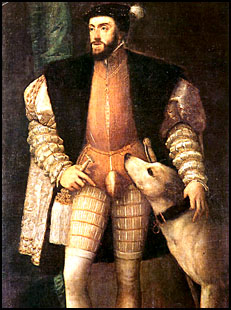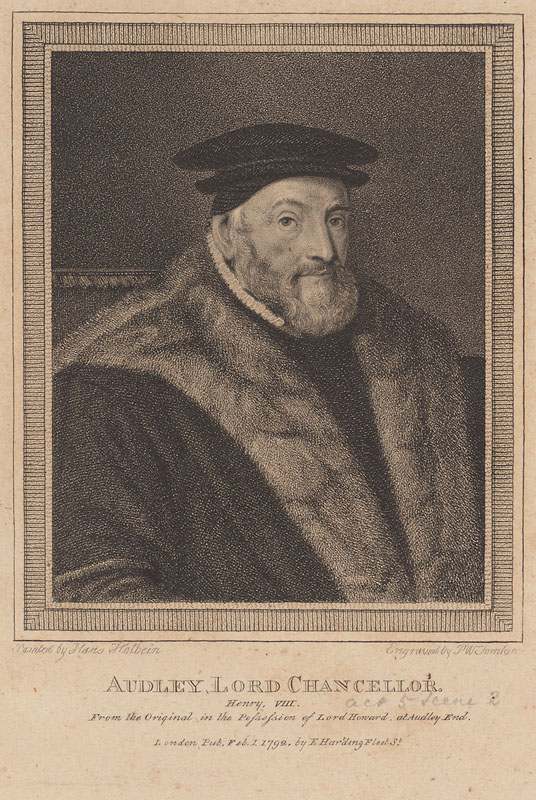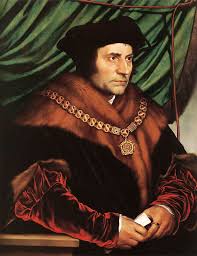Thomas Cromwell: Life Story
Chapter 5 : In the King’s Service (1530 - 1532)
As well as spending more time with the King and his ministers, during 1531 Cromwell continued to immerse himself in legal activities, acting for the King in property matters, but not yet fully involved in policy making. He was not, in 1530, involved in the annulment and without the Cardinal, it appeared that Henry did not know quite how to progress the case. One action the King set in motion was to send Thomas Cranmer, a Fellow of Cambridge, to collect the opinions of the theologians at the various European universities.

He also made a personal appeal to Charles V, but, with a lack of tact that is quite extraordinary, sent George Boleyn, Viscount Rochford, Anne’s brother to make the plea. If Charles V were going to be persuaded to turn a blind eye to his aunt’s humiliation, sending the brother of the “other woman” was not likely to be the most successful method.
By mid-1530, however, the King had a new idea – perhaps he did not need the Pope’s ruling at all. After all, had not English Kings always been supreme in their own realm?Fifteen of the senior clergy were indicted for the crime of praemunire (obeying a foreign power, rather than the King). To avoid conviction, the Convocation of Clergy (the Church’s governing body, subject in spiritual matters only to the Pope) on 24th January 1531 offered Henry the enormous sum of £100,000 in token of its penance.
They acknowledged that he was the Supreme Head of the Church in England, although the caveat “as far as the law of God allows” was hastily tacked on. Cromwell has been credited with putting the notion into Henry’s head, but there is no evidence at all supporting that – no letters and no memoranda, which is not, of course, proof in itself, but given the amount of correspondence and paperwork that exist relating to Cromwell it is likely some note would be there.
Nevertheless, Cromwell’s influence was growing and by the middle of 1531 he appears to have been involved in drafting bills to be placed before the Parliamentary session that opened in January 1532. The bills ranged from procedural matters about the import of bow-staves to further measures to curb the power of the Church. Following the payment of the aforementioned fine by Convocation, an act was introduced “forgiving” both clergy and laity. Cromwell seems to have worked with another of Henry’s advisers, the lawyer, Thomas Audley, Speaker of the House in the Reformation Parliament, on drafting bills.

An early scheme for solving the annulment issue was suggested – the supremacy of the Archbishop of Canterbury over the English bishops would be invested in Convocation instead, thus enabling Convocation to grant the annulment that Archbishop Warham would not. Henry himself felt this was too controversial, and, instead, decided that a threat to the Pope’s purse would be more effective.
A bill to stop the payment of “first fruits and annates” (the first year’s income for a new bishop, customarily paid to the Pope) was introduced, although Cromwell seems to have been somewhat dubious about its efficacy. A clause was added, to keep the Act in abeyance until the King implemented it by letters patent, which demonstrates that even as late as Spring 1532, Henry still hoped that the Pope would grant his annulment. Despite the anti-clerical stance of the Commons, only Henry’s personal intervention, through a visit to the Lords, got the bill through the Upper House.
The House of Lords may have had misgivings about attacks on Rome and the Church, but the Commons had the bit between their teeth. In 1529, Cromwell had drafted a series of complaints against the Clergy on behalf of the Commons that was now developed further into the “Supplycacion against the Ordinaries (Ecclesiastic supervisors)” of 1532.
This “Supplycacion” was a petition from the Commons to the King to control the powers of the Church.There is debate over whether the petition was spontaneous and truly represented the feeling of the Commons, or whether it was set up by the King, using Cromwell as his tool. As noted before, London, in particular, had a strong anti-clerical feeling so it may be that the King, whose intelligence and political acumen is often underrated, saw an opportunity to put further pressure on the Pope by listening to the Supplication.
After a lengthy preamble in which the Commons alleged that dissension was being sown, not only by the growth of ‘heretical opinions’, but, more substantially by the ‘uncharitable behaviour of the Ordinaries’ the Supplication puts forward various complaints that Parliament wished the King remedy. These included, conveniently for the King, a complaint against the authority of Convocation. Convocation was too powerful, and used its authority in arbitrary fashion.
In support of the view that the Supplication did really emerge from the Commons, Henry did not immediately act, but requested a reply from Convocation. In April 1532, when Convocation reconvened it had prepared an answer against the Supplication. The meat of Convocation’s reply was that scripture upheld its position as a law-making body. Individual failings of clergy did not negate the laws of the church. Regardless of whether he had been behind the Supplication or had just decided to use this new tool that had fallen into his hands, Henry was not satisfied.
On 10th May 1532, Convocation was required to assent to three articles that effectively established royal authority over them. In essence, Convocation could only make and enforce canon law with royal assent. The following day, the King made a speech in Parliament saying that he now saw that the clergy were but “half his subjects” and that their allegiance to Rome was contrary to their allegiance to him, but that he was sure the Commons, being “a great sort of wise men” would know how to act. Cromwell and Audley drew up a plan for Convocation, acceptance of which would require it to submit all of the existing Canon law to the King for approval, after it had been vetted by a committee of Clergy and Commons, and any items repugnant to the law of England deleted.

Warham’s compromise suggestion was refused and on 16th May 1532, the Convocation of Clergy submitted itself to Crown jurisdiction. As the Imperial Ambassador, Chapuys noted, Convocation was now less than the guild of cobblers, as the cobblers could at least manage their own guild and make rules for it. On 17th May, Sir Thomas More, resigned the Chancellorship, and was replaced by Audley.




